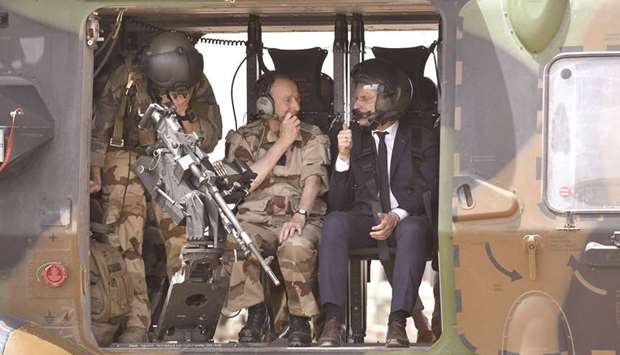French President Emmanuel Macron suffered his first major political setback yesterday when the head of the armed forces, General Pierre de Villiers, resigned in a row over cuts to the defence budget.
De Villiers’ resignation — the first by a French joint chief of staff since 1961, according to newspaper Le Monde — came less than a week after Macron issued him with a fierce public reprimand in front of troops, albeit without mentioning him by name.
De Villiers will be replaced by General Francois Lecointre, who headed an EU military training mission in Mali in 2013 and also served in Rwanda, Gabon and Bosnia, government spokesman Christophe Castaner announced.
The joint chief of staff — reappointed for an additional year only weeks earlier — had objected strongly to a government decision that the military should bear the brunt of one-off cuts aimed at meeting deficit reduction targets in the 2017 budget.
The military budget was targeted for 850mn euros out of a total of 4.5bn euros of budgetary savings announced last week.
De Villiers said in his resignation statement that he was “no longer able to ensure the durability of the model of army I believe in to guarantee the protection of France and the French people”.
The French military is deployed in Mali and Chad to aid local forces against jihadists and has also been engaged in an intensive domestic security deployment since terrorist attacks in Paris in January 2015.
In a column in Le Figaro on Friday, de Villiers wrote that the combination of 30,000 soldiers “in operational posture day and night” and “a complicated budgetary context” was “not tenable”.
Macron mounted a vigorous response in the president’s traditional pre-Bastille day address to top officers and troops, while repeating his pledge to raise defence spending from next year.
With de Villiers in attendance, he told the military: “I am your chief. I know how to keep my commitments to our fellow citizens and our armed forces. I don’t need any pressure or commentaries.”
Macron has played up his position as commander in chief of the military since his election in May, visiting troops in Mali and military installations in France.
But he has also been insistent on his own authority and on the need to reduce the budget deficit to the general EU target of 3 per cent of gross domestic product.
“The head of the armed forces has the authority to be head of the armed forces,” Castaner said, referring to the president’s constitutional position as the head of the military.
But the departure of de Villiers led opponents of Macron to castigate the president’s style of governing while paying tribute to the general.
His resignation was “the consequence of unkept commitments to our armed forces and of a form of humiliation of the military institution that betrays a febrility at the highest level of the state”, said Bernerd Accoyer, general secretary of the centre-right Les Republicains party.
The Socialist Party’s leader in the National Assembly, Olivier Faure, accused Macron of provoking a “democratic crisis” with a “humiliation” of de Villiers after the general’s initial criticism of the cuts, which was made during a closed session of the assembly’s defence committee but widely leaked.
Faure took aim at what the media, in reference to the supreme god of ancient Rome, has dubbed Macron’s “Jupiterian” approach to the presidency.
“Even Jupiter should be able to distinguish between laudable authority and an indecent authoritarianism that takes pleasure in personal power,” he charged.
Castaner, who insisted that de Villier’s comments at the National Assembly last Wednesday were not a factor in his resignation, asked journalists to “consider that our army is in very good hands”.
Lecointre, the incoming joint chief of staff, was “a recognised hero in the army”, Castaner said, noting that during his service with UN forces in Bosnia in 1995, when he was a young captain, he “was able to liberate [captured] soldiers” when he led a bayonet charge to recapture a bridge in Sarajevo from Bosnian Serb forces.

French President Emmanuel Macron with General de Villiers.
